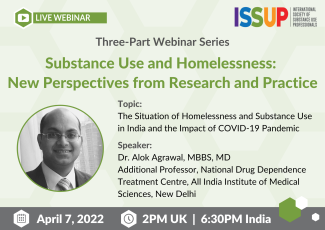Search
Prozkoumejte online výukové centrum ISSUP
Situace v oblasti bezdomovectví a užívání návykových látek v Indii a dopad pandemie COVID-19
Observační prospektivní kohortová studie užívání naloxonu při předávkování, Kazachstán, Kyrgyzstán, Tádžikistán, Ukrajina
Abstraktní
Objektivní
S cílem zjistit, zda účast v Úřadu OSN pro drogy a kriminalitu (UNODC) a Světové zdravotnické organizace (WHO) Stop Overdose Safely (S-O-S) take-home naloxon vzdělávací projekt v Kazachstánu, Kyrgyzstánu...
Faktory spojené s retencí léků na poruchu užívání opiátů u kohorty dospělých, kteří vyhledávají léčbu v komunitě
Abstraktní
Pozadí
Léčba poruchy užívání opiátů (MOUD; buprenorfin a metadon) snižuje užívání opiátů a předávkování. Přerušení léčby MOUD může rychle vést k relapsu, předávkování a smrti. Jen málo osob, které zahájí MOUD, zůstává na léčbě...
Diagnostic Utility of New Short Versions of AUDIT to Detect Binge Drinking in Undergraduate Students
Abstract
This study examines the usefulness of two AUDIT adaptations with a sample of 907 undergraduate alcohol users. On the one hand, it includes the AR2i that encompasses revised A2r and A3r consumption items, and on the other hand—in...
Role věku nástupu v problematické konzumaci alkoholu: artefakt nebo kohortový efekt?
Abstraktní
Věk nástupu byl hlášen jako rozhodující prediktor pro konzumaci alkoholu v dospívání. Několik autorů však před ním varovalo jako před nespolehlivým artefaktem, který je vysvětlen tendencí odkládat věk nástupu s rostoucím věkem...
Asociace konzumace alkoholu a kouření s rizikem onemocnění a neurodegenerací u jedinců s roztroušenou sklerózou ve Spojeném království
Abstraktní
Význam Pochopení účinků modifikovatelných rizikových faktorů na riziko roztroušené sklerózy (MS) a související neurodegenerace je důležité pro vedení klinického poradenství.
Cíl: Prozkoumat souvislosti užívání alkoholu...
Effect of Combination Treatment With Varenicline and Nicotine Patch on Smoking Cessation Among Smokers Who Drink Heavily A Randomized Clinical Trial
Abstract
Importance The concurrent use of both tobacco and alcohol causes substantial disease and early mortality, and smokers who drink heavily tend to be less successful in smoking cessation than smokers who do not. Although varenicline...
People with tobacco use disorder exhibit more prefrontal activity during preparatory control but reduced anterior cingulate activity during reactive control
Abstract
Reduced inhibitory control and a hypersensitivity to reward are key deficits in drug dependents; however, they tend to be studied in isolation. Here, we seek to understand the neural processes underlying control over reward and...
Dlouhodobé důsledky užívání alkoholu u myší v raném dospívání: Zaměření na neuroadaptace u GR, CRF a BDNF
Abstraktní
Naším cílem bylo posoudit kognitivní a emoční stav, stejně jako související změny v glukokortikoidním receptoru (GR), faktoru uvolňujícím kortikotropin (CRF) a expresi neurotrofického faktoru odvozeného z mozku (BDNF) u...
The relationship between craving and insular morphometry in regular cocaine users: Does sex matter?
Abstract
While it has been suggested that cocaine use and relapse in women is more strongly related to stress-relief craving, whereas cocaine use in men is more strongly related to reward craving, the neural mechanisms that underlie these...
Anomálie v globální síťové konektivitě spojené s časným zotavením ze závislosti na alkoholu: studie transkraniální magnetické stimulace a elektroencefalografie
Abstraktní
Ačkoli předchozí výzkum u populací závislých na alkoholu identifikoval změny v místních strukturách obvodů "odměny" závislosti, existuje omezený výzkum globálních rysů této sítě, zejména v časném zotavení. Transkraniální...
Alcohol-related stimuli modulate functional connectivity during response inhibition in young binge drinkers
Abstract
Binge drinking is a pattern of intermittent excessive alcohol consumption that is highly prevalent in young people. Neurocognitive dual-process models have described substance abuse and adolescence risk behaviours as the result of...
Effects of family history of substance use disorder on reward processing in adolescents with and without attention-deficit/hyperactivity disorder
Abstract
Patients with attention-deficit/hyperactivity disorder (ADHD) often develop early onset substance use disorder (SUD) and show poor treatment outcomes. Both disorders show similar reward-processing alterations, but it is unclear...
Sulphated dehydroepiandrosterone serum levels are reduced in women with alcohol use disorder and correlate negatively with craving: A sex-separated cross-sectional and longitudinal study
Abstract
Previous studies have established a role of sex hormones in alcohol use disorder (AUD).Only few clinical investigations with low numbers of patients with AUD have focused on the sulphated form of dehydroepiandrosterone (DHEA-S)...
Sex differences in acute cannabis effects revisited: Results from two randomized, controlled trials
Abstract
Some evidence suggests that males and females may differ in their responses to acute cannabis effects, including subjective drug effects and behavioural effects, and cannabinoid pharmacokinetics. This is significant given current...
Multimodal MRI data fusion reveals distinct structural, functional and neurochemical correlates of heavy cannabis use
Abstract
Heavy cannabis use (HCU) is frequently associated with a plethora of cognitive, psychopathological and sensorimotor phenomena. Although HCU is frequent, specific patterns of abnormal brain structure and function underlying HCU in...
From binge eating to binge drinking: A new and robust paradigm for assessing binge ethanol self-administration in male rats
Abstract
Animal models of alcohol (ethanol) self-administration are crucial to dissect the neurobiological mechanisms underlying alcohol dependence, yet only a few of these induce pharmacologically relevant levels of alcohol consumption...
Overcoming the pains of recovery: The management of negative recovery capital during addiction recovery pathways
Abstract:
Pains experienced as a result of negative recovery capital are often thought to stimulate motivations for positive behavioural change, usually through a ‘rock bottom’ type moment. Whilst recovery capital and barriers to recovery...
Share the Knowledge: ISSUP members can post in the Knowledge Share – Sign in or become a member

